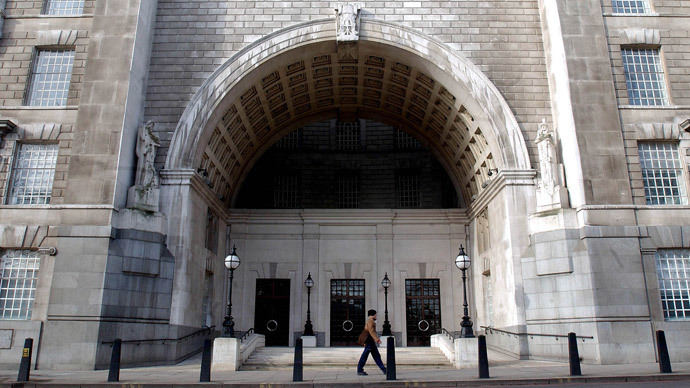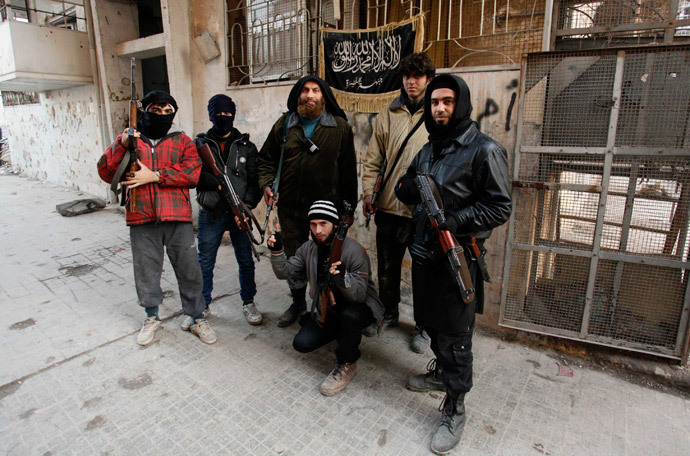British Syria-radicalized jihadists biggest threat to UK national security

Radicalized UK citizens returning from Syria are the biggest threat to national security, official reports claim. With increasing access to equipment and training, there are growing fears Brits are encouraged to carry out attacks on home soil.
The 500 Britons who have gone to fight in Syria over the past three years put the Middle-Eastern country in Whitehall’s sights as a much more dangerous place for radicalization than Iraq. An assessment by the MI5 spells out how alluring Syria has become to UK jihadists.
“The nature of the conflict in Syria and the emergence of Al-Nusra Front, which has declared its allegiance to Al-Qaeda leader Ayman al-Zawahiri, is leading to the country becoming an increasingly significant potential source of future threats to the UK and UK interests overseas,” the text also reads.
Concerns over the grave threat have been confirmed to the Telegraph by an unnamed Whitehall contact.
“The threat to the UK comes from a range of countries and groups but Syria is perhaps the biggest challenge right now,” they explain. The Home Office annual review likewise states that the country has been identified as “the most significant development in global terrorism.”
This is believed to be because a whole range of potentially threatening aspects to the UK’s national security is being seen emanating from one single country.
And although the recommendations keep coming in, a lot of them aren’t new. Last year as well, the director-general of the MI5, Andrew Parker, told Parliament that the Syrian conflict has become a magnet for British nationals looking to engage in jihad, many of whom come into contact with Al-Qaeda-linked groups.
The security services are said to be closely monitoring some 250 returnees, who include several veteran hardliners who have fought in Afghanistan or Pakistan, other reports have claimed. Many others have participated in combat or received training in munitions or other skills applicable to terror operations, with some exhibiting a willingness to carry out attacks in the UK, security officials cited in another, February government report said.
But unlike the terrorism hotbeds that are Afghanistan and Pakistan, Syria is much closer to Europe, making it the ideal destination to go, get radicalized and come back with deadly ideas. And because the MI5 can’t keep a watch on all of them, just around half of the British citizens who return are essentially roaming the country without any supervision.
Even before the current report and recommendations, senior security officials in February said the number of returnees is now five times the previously reported figure.
“There are a few hundred people going out there. They may be injured or killed, but our biggest worry is when they return they are radicalized, they may be militarized, they may have a network of people that train them to use weapons,” London Police Chief Sir Bernard Hogan-Howe explained to the Times then.

In sum, the combination of proximity to Europe, a rise in the number of extremist groups, easy availability of training and weapons and the ability to travel back and forth through badly-controlled Middle-Eastern borders, is seen as deadly.
Further to the problem, many returning jihadists don’t fit the psychological profile. Recent months have seen details released about the first suicide attack carried out by a British national in Syria. Abdul Waheed Majeed is believed to have driven an explosives-laden truck into a jail in Aleppo earlier this month, joining some 20 British citizens to have died fighting in the Syrian civil war.
Speaking to RT in February, political commentator Mohammed Ansar explained how Majeed’s attack presented a difficulty for the security services because “he does not fit the profile of a young British jihadi who has gone to Syria to fight,” adding also that “fighters from Britain have been calling others to come and join them.”
Similar troubles with profiling occur when women fighters are involved, and such cases are increasing.
And the threat is regionally contagious. Speaking to the Independent about the recommendations he would offer, Gilles de Kerchove, the EU's counter-terrorism coordinator expressed fears that if counter-terrorism budgets across the continent don’t go up, we will be seeing an even steeper rise in foreign radicalization than presently.
"We should be investing a lot more in counter-terrorism work, including externally, if we are to prevent or mitigate future terrorist attacks," he said, adding that “National budgets devoted to counter-terrorism are declining across the EU. Yet the threat that we face is becoming more diverse, more diffuse, and more unpredictable."
But while Britain’s MI5 is among the agencies promising to take an ever tougher stance on nationals planning to engage in terrorism on home soil, the public is asking questions. Robert Spencer, the director of Jihad Watch, and the author of 13 books, notably on Islam and the West, asks on his website why more returnees aren’t being monitored and why they are being allowed back into the country so easily (and if they are even British citizens).
At the same time, Spencer sees that the British government knows full well who the counter-jihadists are (Spencer included) and doesn’t hesitate to turn them away at the border. He also accuses the British government of being particularly lax on the issue for fear of hurting the Muslim community’s feelings and sparking accusations of Islamophobia.
And still not all believe the jihadists to be a lost cause. In fact some, like Ansar, believe would opt for a different strategy – that of de-radicalization and reintegration into British society. It will not be easy, Ansar claims, but studying the British jihadists’ motives will enable us to better understand how to deal with this rising problem.














